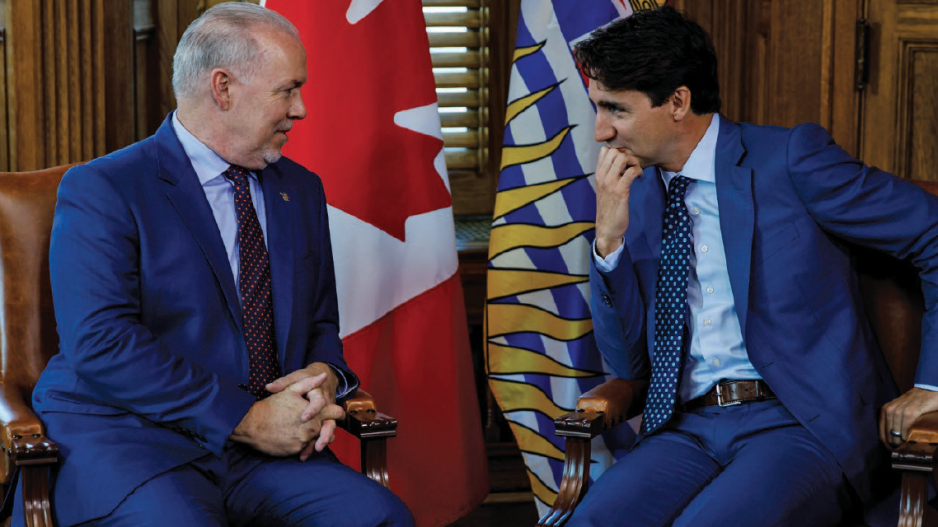Failure to resolve the softwood lumber dispute will eventually take its toll on B.C.’s forestry sector, especially smaller mill operators.
But to date, B.C.’s big three publicly traded forestry companies have absorbed preliminary countervailing and anti-dumping duties through strong earnings, thanks to high lumber prices.
The cost of preliminary American duties against Canadian softwood lumber showed up in second-quarter financial reports of B.C.’s largest forestry companies recently.
In its most recent Q2 report, Canfor Corp. (TSX:CFP) reported that it has now placed $34.8 million on deposit to cover preliminary countervailing and anti-dumping duties. West Fraser Timber (TSX:WFT) reports duties totalling $34 million for the second quarter, as well. Interfor Corp. (TSX:IFP) calculates the duties it might have to pay at $14.4 million.
But all three companies posted strong earnings for 2017’s first half.
“The margins are as high as I’ve ever seen them, going back to 2004 and 2005,” said Russ Taylor, president of the International Wood Markets Group. “The first quarter was great, the second quarter was better.”
B.C. lumber producers are benefiting from tight supplies and high prices for lumber, in both the U.S. and China. Some B.C. companies might be feeling the more immediate impacts of wildfires than softwood lumber duties. Fires have forced the closure of some sawmills.
Tolko, for example, had to close its Quesnel sawmill due to a forced curtailment of logging and a resulting log supply shortage. West Fraser Timber also shut sawmills in Williams Lake and 100 Mile House.
But those shutdowns could intensify an already tight supply and drive prices higher. So while mill closures will affect those individual companies, others could benefit from the resulting price lift.
Lumber prices are so strong that any duties that companies are being forced to place on deposit can be passed onto customers, Taylor said.
“Because the market’s a bit tight, the Canadians have been able to pass on the duty,” Taylor said.
After adjusting for the $34.8 million in American duties, Canfor’s Q2 2017 operating income was $165.8 million – up $59 million from the first quarter. Canfor is planning to spend $105 million on energy efficiency projects at its pulp mills in Prince George and Taylor, B.C.
Interfor’s sales for the first six months of 2017 came close to $1 billion. Its total sales in Q2 were $962 million, compared with $892.8 million in Q2 2016.
Interfor, Canfor and West Fraser have been spreading the risk they face over American protectionism and a shrinking fibre supply in B.C. through the acquisition of American sawmills.
West Fraser, which already owns 16 sawmills in the American southwest, last week announced plans to invest another US$430 million to acquire six sawmills and a fingerjoint mill in Georgia and Florida.
While Canadian lumber producers are currently being cushioned against softwood lumber duties thanks to high lumber prices, Canada is under pressure to get a long-term negotiated settlement before the North American Free Trade Agreement (NAFTA) is renegotiated.
One U.S. NAFTA demand is the removal of a chapter that allows disputes between Canada and the U.S. to be settled by international tribunals, which have consistently ruled in Canada’s favour when it comes to softwood lumber duties. Were future disputes to be decided by American courts or tribunals, rulings might not always go Canada’s way.
“The pressure is on right now,” Taylor said. “If you miss that window, it could go on for years.”
At the end of July, in his first official trip as premier of B.C., John Horgan joined B.C.’s special trade envoy on softwood lumber, David Emerson, to meet with American Secretary of Commerce Wilbur Ross and U.S. Trade Representative Robert Lighthizer – who is in charge of NAFTA talks – in Washington. Horgan came away from the meeting optimistic.
“Both of them left David Emerson and I with the impression that their objective was to have the softwood deal resolved in the interest of all parties before we got deeply into the NAFTA negotiations,” Horgan told Business in Vancouver. “So I am hopeful that that can be translated into some potential success in the weeks ahead.
“I think that we’ve got four to six weeks of intense discussions ahead of us, and I’m hopeful we’ll get an agreement that meets the needs of forest workers and forest companies here in B.C.”
Taylor said the Canadian forest industry and the Canadian government now seem to be giving serious consideration to a quota system – something the Americans have proposed.
“It seems like the appetite for a quota has now picked up,” Taylor said.
B.C.’s long-term share of the American market has been shrinking anyway and is projected to continue to shrink for many years to come, thanks to a long-term shrinkage of B.C.’s annual allowable cut.
If the U.S. and Canada agreed to a quota system, the provinces would then have to wrangle over how that national quota would be shared among provinces, which would then have to decide how much quota to give individual companies.
Last week, Canadian Foreign Affairs Minister Chrystia Freeland said the broad strokes of a new softwood lumber agreement are in place. Meanwhile, the initial negotiations of a renegotiated NAFTA are set to begin this week on August 16. •




